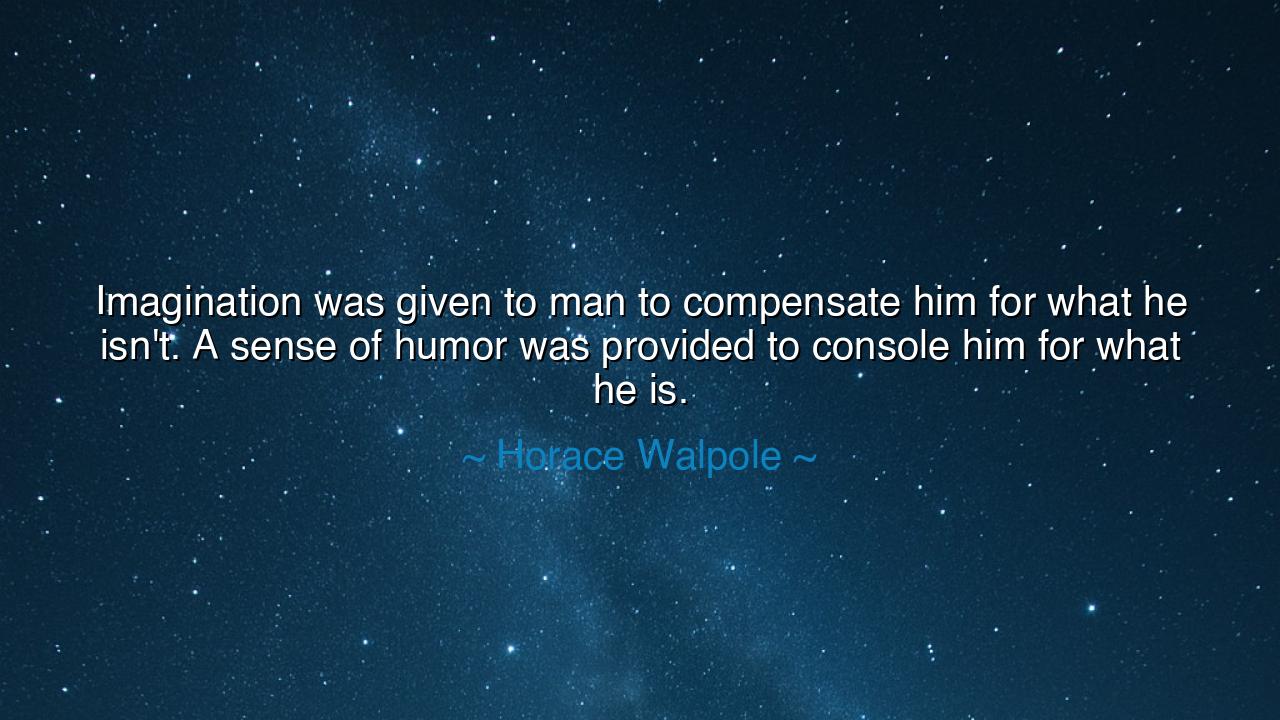
Imagination was given to man to compensate him for what he isn't.
Imagination was given to man to compensate him for what he isn't. A sense of humor was provided to console him for what he is.






Long ago, the English writer and philosopher Horace Walpole gazed upon the strange duality of humankind—the dreamer and the fool, the creator and the struggler—and uttered this timeless truth: “Imagination was given to man to compensate him for what he isn’t. A sense of humor was provided to console him for what he is.” In these words lies a wisdom both tender and piercing. For Walpole saw that man is a being forever torn between aspiration and imperfection, ever reaching for what he cannot yet become, and ever needing to laugh at what he already is. Imagination and humor are not mere ornaments of the mind; they are the twin pillars that uphold the human spirit against despair.
The first gift, imagination, is man’s divine rebellion against limitation. It is the breath of creation that allows him to see not only the world that is, but the world that could be. Through imagination, the beggar dreams of kingship, the prisoner of freedom, the weary of rest. It is the bridge from what man is not yet to what he hopes to be. Without imagination, the human soul would remain chained to the dull weight of reality, unable to soar, unable to create beauty or meaning. It is the seed from which every poem, every discovery, every act of love and hope is born.
But the second gift—humor—is gentler, humbler, and equally sacred. For if imagination exalts, humor redeems. It is man’s comfort in the face of his own folly, the medicine for his wounded pride. When Walpole said that humor was given “to console him for what he is,” he meant that laughter is the soft cloak we wear against the cold truth of imperfection. To laugh at oneself is not to despair, but to be wise. It is the soul’s confession that while we are flawed, we are still worthy of joy. Humor transforms the tragedy of human weakness into music, turning sorrow into song and failure into fellowship.
Consider the tale of Abraham Lincoln, that great leader of courage and sorrow. Burdened with the weight of a nation’s suffering, he often met anguish with laughter. Once, when criticized for his long face, he replied, “If I had another face, do you think I’d be wearing this one?” The jest was light, but its wisdom deep. Lincoln’s humor was not frivolous—it was a shield against despair. It reminded both him and those around him that even amid hardship, the human spirit could remain unconquered. Like Walpole, he understood that humor does not erase suffering; it gives it meaning.
Walpole himself was a man of contradictions—an aristocrat who feared grandeur, a philosopher who cloaked truth in wit. He lived in the age of reason, yet he spoke for the heart. His words reveal that he saw mankind as forever caught between divine imagination and human frailty. The same mind that can conceive of paradise also stumbles in folly; the same tongue that prays also complains. And so, Providence, in its mercy, gave us two sacred tools: imagination to lift us from the earth, and humor to keep us from flying too close to the sun.
Indeed, imagination and humor are the balance of the human soul. Imagination without humor becomes arrogance—it dreams without humility, and so it destroys itself. Humor without imagination becomes cynicism—it laughs without hope, and so it decays. But together, they form the perfect harmony of the human condition: to reach high and yet laugh when we fall, to dream fiercely and forgive our stumbles. Through them, man remains both aspiring and accepting, both poet and pilgrim, both fool and divine spark.
So, my children of thought, remember this teaching: cherish both imagination and humor as sacred gifts. Use imagination to build the world that your heart desires—to create, to love, to envision what could yet be. But when your dreams falter, when your flaws rise to meet you, let humor be your comfort. Laugh, not in mockery, but in mercy. Laugh because you are human, and because to be human is a wondrous, foolish, beautiful thing.
For the one who dreams yet laughs, who strives yet forgives himself, walks in true wisdom. He knows that life is not to be conquered, but to be danced with. Thus Walpole’s words endure: imagination lifts the soul, humor saves it. Together, they make man not perfect—but beautifully whole.






AAdministratorAdministrator
Welcome, honored guests. Please leave a comment, we will respond soon